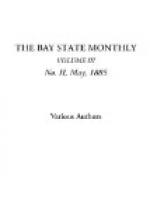I turn now to another phase of his nature, and recall that he had not grown up to manhood without the usual experiences of the tender passion. It was while he was yet living at New Salem that his heart opened to a fair, sweet-tempered, and intelligent girl, with the romantic name of Anne Rutledge. They were engaged to be married as soon as he should be admitted to the bar of the Supreme Court. But in August, 1835, she died. Her beauty and her attractions and her early death made a very deep impression upon him. We are told that he idealized her memory, and in his recollections of her there was a poetry of sentiment, which might possibly have been lessened, had she lived, by the prosaic realities of life. With all his love of fun and frolic, with all his wit and humor, with all his laughter and anecdotes, Lincoln, from his youth, was a man of deep feeling. We have it on the authority of the most reliable of his biographers, that he always associated with the memory of Anne Rutledge the poem which, in his hours of despondency, he so often repeated:—
“Oh! why should the spirit of mortal
be proud?
Like a swift fleeting meteor, a fast flying
cloud,
A flash of the lightning, a break of the
wave,
He passeth from life to his rest in the
grave.
“The leaves of the oak and the willow
shall fade,
Be scattered around, and together be laid;
And the young and the old, and the low
and the high,
Shall moulder to dust and together shall
lie.”
I never read this beautiful poem, so full of the true philosophy of life, so suggestive of the rich promises of the hereafter, that I do not think of the great president. He first found it in the columns of a newspaper, cut it out, carried it in his pocket, and treasured it in his memory for many years without knowing who was its author.
It would be pleasant to trace the years spent by Mr. Lincoln in the State Legislature, and to revert to some of the speeches and occasional addresses belonging to those years, which, in the light of his subsequent history, are strangely significant. In the early period of his legislative career he became acquainted with Stephen A. Douglas, while the latter was a school-teacher at Winchester. Douglas was a man of extraordinary powers, and one of the readiest of the American debaters of his time. As the years went on he became actively interested in politics, and at length assumed the leadership of the Democrats in Illinois, while Lincoln became the standard-bearer of the Whigs. When party platforms were promulgated, upon the eve of important contests, these two statesmen, by the unanimous consent of their supporters, were selected to debate the merits of their respective political creeds before the people. A series of joint discussions was arranged to take place in the various important towns of the State. The assemblages were large, and were composed of men of all parties. The discussion opened with a speech of an hour, from one of the debaters; the other replied in an address of an hour and a half; a rejoinder of half an hour brought the discussion to a close. At the next meeting the order of speaking was reversed, and by this arrangement the “last word” was indulged in alternately by each debater.




